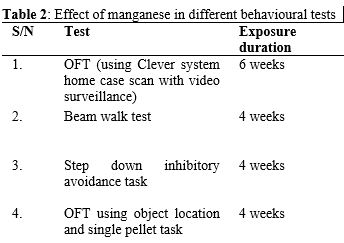Cognitive, Sensory, and Motor Impairments Associated with Aluminium, Manganese, Mercury and Lead Exposures in the Onset of Neurodegeneration
DOI:
https://doi.org/10.54117/ijph.v2i1.9Keywords:
Neurodegenerative disease, behavioural alterations, neurotoxicity, heavy metalsAbstract
Neurobehavioral investigations are essential for assessing the risk of heavy metal toxicity. This review provides a general overview of the cognitive and motor consequences associated with Al, Mn, Hg, and Pb exposure during early life as well as during adult stage in the onset of neurodegenerative diseases. This review showed that heavy metal exposure in early life results in more impacts due to the vulnerability of the blood brain barrier. The effects of Al, Mn, Hg, and Pb includes defects in habituation, decreased in rearing activity; intense defecation, motor impairments, decreased spatial memory and performance; declines in reference, recognition and working memory. It also causes an increase in the number of errors, an increase in the time it takes to find the platform, an increase in swimming distance, and a decrease in step-through latency and many others. Hence, Heavy metals are acknowledged inducers of behavioural toxicity and serve as sensitive endpoints of chemically produced neurotoxicity.

Downloads
Published
How to Cite
Issue
Section
License
Copyright (c) 2023 Chinyere Dike, Mfoniso Antia, Bolaji Bababtunde, Francis Sikoki, Anthonet Ezejiofor

This work is licensed under a Creative Commons Attribution 4.0 International License.
